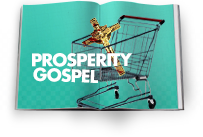The Soil of the Prosperity Gospel
Two days after Thanksgiving, Paul Crouch met his Maker. Along with his wife Jan, Crouch established the Trinity Broadcasting Network (TBN) in 1973 and built it into a media empire with 84 satellite channels, more than 18,000 television and cable affiliates, an amusement park, and much more. TBN broadcasts around the clock to every continent except Antarctica, with much of its content promoting the prosperity gospel that made Paul and Jan Crouch so wealthy. This message clearly appeals to many people, which raises the question of how it has taken root in our age.
While the prosperity gospel comes packaged in a number of different forms—Word of Faith, Positive Confession, and so on—the core product is consistent. At its heart is the conviction that human words and faith shape reality. We are empowered to speak life into being, but regrettably few of us are aware of this great privilege. The reason we do not have the financial security, health, and success we want is that we do not call it forth and draw it unto ourselves. Beneath this claim rests a high anthropology, which regards human beings as fundamentally good and ultimately powerful.
One need not look far to see that this message has resonated with a massive audience, both in the United States and abroad. Joel Osteen, Creflo Dollar, Joyce Meyer, T. D. Jakes, Benny Hinn—the list of celebrity prosperity preachers is seemingly endless, with many of them broadcasting on TBN. These preachers hawk their television ministries, books, podcasts, CDs, and retreats to hungry consumers eager to find out how they can maximize their potential to live a life of fullness and well-being, to “break out” of the desperation of broken dreams and dashed hopes (as Osteen’s latest book instructs).
It is a tempting and intoxicating brew, appealing to basic human inclinations and culturally conditioned desires, offering a quick high but a nasty hangover. And it’s extremely lucrative for its purveyors, since one of the principal ways to demonstrate faith is to sow financial seeds, which is to say, give gifts to prosperity preachers or purchase their products. The resulting fleets of luxury automobiles, massive homes, and Italian suits might strike critics as garish, but prosperity preachers retort with a smile that their lives and bank accounts merely verify the truth of their messages.
How did we get to a place where such a clearly debased form of Christianity holds sway with so many people?
ANCIENT SEED, MODERN SOIL
The prosperity gospel is the bitter harvest of an ancient seed planted in modern soil. This seed is as old as Adam and Eve and as enduring as humanity itself. From the Fall onward, human beings have sought to make gods of themselves, make idols of the good things in life, and domesticate the true and living God so that we can (ostensibly) enlist him in our schemes of enrichment and aggrandizement.
The fertile soil, meanwhile, is composed of several features of modernity.
Modernity
Historians debate the periodization and meaning of the term “modernity,” but most conclude that the human effort to radically enhance our control over all aspects of life has been central to the modern project. We see this in the scientific realm, where new methods and tools have produced enormous capacities to harness the powers of nature for good and ill. We see it in the political sphere, where our Enlightenment-inspired Founding Fathers declared it a novus ordo seclorum; as Thomas Paine proclaimed in Common Sense, “We have it in our power to begin the world over again.” We see it in the technological realm, where handheld devices now provide common people with capacities unimaginable just decades ago.
But we also know that these promises come up short. Science produces medical cures but also eugenics. Political revolution produces democracy but also totalitarian tyranny and devastation. Technology produces the internet, which we proceed to fill with pornography, to say nothing of the ever more ingenious mechanisms human beings have devised to slaughter and terrorize one another.
Postmodernity
The nightmare horrors of the twentieth century produced backlashes against the hubris of modernity, resulting in a crisis of confidence and existential anxiety that has been called “postmodernity.” If modernity asserted our collective capacity to improve the human race to the point of possible perfection through the application of our powers to the problems we faced, postmodernity has cast doubt on all “metanarratives” that would seek to guide our path. This has thrown the individual back upon himself in a world of fragmentation and incoherence.
But as many commentators have noted, postmodernity is not as “post” as its advocates would like to think. If it has jettisoned the grand vista of modernity, it has extracted the individual pictured therein. We no longer believe that human reason is a universal trait that, when applied correctly, can produce unanimity and guide us to first principles. But culturally, we still adhere to modernity’s distrust of external authority and tradition. We may despair of collective advancement, but we are deeply committed to personal advancement through individual empowerment and liberation from constraints. The prosperity gospel finds a ready hearing in this setting.
Consumer Culture
This stark individualism has been fomented by many factors, not least the consumer culture that drives late modern capitalism. Given sufficient money, the consumer is sovereign, slaking his desires and improving his life. Or so the advertisers tell us.
The logic of consumer culture requires us to want ever more and to continue believing that those purchased products and services will make us better—sexier, healthier, happier. If enough of us call the bluff, the GDP stagnates and the whole enterprise goes up in smoke.
What consumer culture cannot tolerate is contentment, a sense that our provision is sufficient, that I have more than enough, even if what I have is far from perfect. Instead, it requires restlessness, endless striving, eternal competition and insecurity.
Capitalism
Yet with all its faults, capitalism has produced enormous wealth and improved standards of living, something readily overlooked by its critics. It works better than other existing options, even if it is a deeply problematic system. Particularly susceptible to its allure, and particularly vulnerable to its empty promises, are the upwardly mobile, the aspiring middle class, including immigrants and ethnic minorities. It is not accidental that this is the prime audience of American prosperity preachers.
Capitalism not only generates wealth but also raises expectations for material well-being. If he is debt-free and financially comfortable, why not me? If she has the creature comforts of life without the awful drudgery of a dead-end job, why not me?
Medical Advances
Likewise, advances in health care have raised expectations for our physical quality of life. Life as a “vale of tears” made more sense in a world of smallpox, tuberculosis, and cholera, without reliable analgesics. We live in a rare epidemiological epoch in the advanced world, such that barring accidents and unusual afflictions we can reasonably expect to reach old age.
But of course pain and misery endure, debilitating disease remains all too common, and this side of heaven our embodiment entails suffering. So prosperity preachers leverage our longing for purity, for redeemed bodies and minds that will no longer afflict us. If you have sufficient faith, it will be so.
Globalization
Globalization has enabled the prosperity message to spread abroad with alarming ease. As capitalism has conquered its competitors and as communications and transportation technologies and costs have improved, large markets have opened for prosperity preachers.
We might applaud the spread of Christianity in Africa, Southeast Asia, and Latin America, but it is daunting to recognize how much that marches under the Christian banner is in fact the prosperity gospel. Some of the most prominent churches and most recognizable leaders preach prosperity in poor countries, such as Edir Macedo, founder of the Universal Church of the Kingdom of God in Brazil, and Enoch Adeboye of the Redeemed Christian Church of God in Nigeria. Unlike the aspiring working- and middle-class Americans who watch Joel Osteen or Creflo Dollar on their flat-screen TVs, many Brazilian and Nigerian prosperity adherents can ill afford even the few dollars they give in the hope of reaping their own personal blessing.
WATERING THE SEED: PENTECOSTALISM AND THE CHARISMATIC MOVEMENT
Finally, if the ancient prosperity seed of pride, greed, and idolatry found fertile soil in modernity, it has been watered by Pentecostalism and the Charismatic movement. In their hunger for signs and wonders, early Pentecostals sought the presence and power of God in divine healing and other tangible blessings. In teaching healing in the atonement, parallel to a salvation offered to all and receivable by faith, early Pentecostals diminished the mystery of suffering and God’s providential care. They taught that God willed all faithful Christians to be healthy, and Christ died that it would be so; believers simply had to receive it by faith. If healing didn’t ensue, it was a clear sign that the believer had not exercised faith. This transferred power from a transcendent God who has his own purposes to human beings who desire to be healthy and prosperous.
This theology overlapped in key ways with the mental healing promoted in the late nineteenth and early twentieth-century New Thought movement. In particular, E. W. Kenyon harmonized Pentecostal and New Thought ideas, and in the postwar era Kenneth Hagin embraced his theology and spread it to many of the leading figures in the movement in recent decades.
By no means do all Pentecostals and Charismatics support the prosperity gospel; indeed, at various times leaders and denominations have sought to distance themselves from it, sometimes quite vigorously. But their founding ethos and spiritual sensibilities have nurtured it, as has an ecclesiastical environment that rewards and scarcely checks independent spiritual entrepreneurs.
QUITE A LEGACY
Paul Crouch died of degenerative heart disease at the age of 79. Reports suggest he and his wife have thirteen luxury homes, private jets, and a $100,000 mobile home for Jan’s dogs. He took none of it with him. Presumably he left his empire and wealth to Jan and their children. To far too many others he left a legacy of heresy, deceit, and heartbreak.








